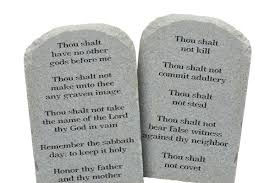Adam and Eve and the forbidden fruit, Jonah and the whale, Noah's ark, the prodigal son, the Good Samaritan . . . It's hard to understand our literature or history without knowing the foundational texts of Western culture, such as the Old Testament and the New Testament.
Texas students will learn stories and history from the Bible and other religious traditions, if a new reading curriculum is approved, writes Linda Jacobson on The 74. It's available for public review here.
Elementary students will read David's psalm, "The Lord is my Shepherd" and learn about the Biblical references in Martin Luther King Jr.’s Letter from Birmingham Jail. After looking at DaVinci's "Last Supper," they read a passage in Matthew to find out what happened.

Students need background knowledge to understand the religious allusions in classic literature and history, Mike Morath, the state education commissioner, told Jacobson. It's a "classical model of education" designed for public schools, he said, not an attempt to teach Christian doctrine.
Conservative parents have complained that a new K-5 English language arts curriculum by Amplify, stresses mythology and ignores religion, writes Jacobson. “There’s one mention of Jesus, that he was a teacher a couple thousand years ago,” said Jamie Haynes, who runs a website on “concerning” curriculum and library books.
If approved, school districts will be given a $60 per student incentive to adopt the curriculum. It will not be mandatory.
Republican legislators have called for putting more Christianity in public schools, write Pooja Salhotra and Robert Downen in the Texas Tribune.
Most of the curriculum's religious references are to the Bible, they note. First graders learn that the inscription on the Liberty Bell -- "proclaim liberty throughout the land'' -- is a reference to "how God helped free the Hebrew people in the Bible."

There is a fourth-grade poetry unit that includes Kshemendra, a Kashmiri poet, philosopher and satirist who “studied Buddhism and Hinduism.” (I've never heard of him either.)
Louisiana legislators have passed a bill requiring public schools to post the Ten Commandments, along with a "context statement highlighting the role of the Ten Commandments in American history," writes Charles J. Russo, a University of Dayton law professor, on the Conversation. The governor hasn't signed yet.
"As someone who teaches and researches law around religion and education, I believe the bill is problematic," writes Russo.
A couple decades ago it would have been a much more significant part of cultural literacy. Today, not so much.
Ann in L.A.
There's no real likelihood that either of these states' efforts will survive judicial review, so signing such misleadingly labelled curricular legislation (the Christians led the suppression of classical Greek and Roman civilization in late antiquity) is a waste of time; instead, English curricula should develop linguistic competencies, which can be more easily developed by studying today's English-speaking world, rather than that of speakers of foreign languages that have largely receded (about which they may learn, nevertheless, in the historical portion of their primary years' curriculum).
Maybe they can explore how the Hebrews handled the Amaleks, Canaanites, Moabites, Midianites, as well as the Bibical foundations for slavery
Teaching the foundations of our culture, be it Christianity or anything else, is not "establishing religion". The fact that the progressive education establishment has managed to root out any mention of our culture or heritage merely because it started with Christianity should have been a wake up call to everyone.
More Christianity? Sounds like more Judaism to me. Not that there's anything wrong with that.🙂🙂